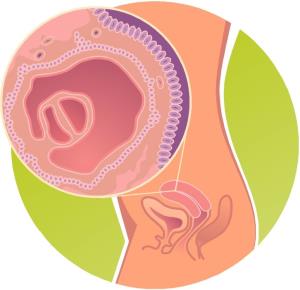
Wanting to fall pregnant? You'll be having lots of sex this week!
It helps if you know exactly when you're ovulating to increase the odds. Try our fertility calculator to determine when your best conception dates are. You can fall pregnant the first time, but it usually takes a couple (under age 35) on average 6 cycles before they fall pregnant. There really are so many factors that all need to align for conception to happen, that it really is a miracle when it happens!
Your baby
You're now in the middle of the 28-day menstrual cycle and you'll hopefully be ovulating at the end of this week, the point at which you're most likely to conceive. Having sex this week without protection could lead to pregnancy – when you ovulate, the ripe and ready egg travels into your Fallopian tube, where it may meet your partner's sperm which have travelled up through your cervix into the womb.
Sperm can live up to 5 days in your womb, so if you have sex this week and you ovulate in 5 days, there's a chance that this may be the month!
If the egg got fertilised, it will move down your Fallopian tube towards your uterus, go into overdrive, dividing into two cells just 30 hours after conception, then four, then eight and so on. By one week after fertilisation, the egg has grown to 250 cells.
What you may be feeling: ovulation
Some women can tell when they're ovulating. Here are signs that you're fertile:
- Cervical fluid
- Your basal body temperature shoots up
- Softer cervix, swollen labia
- Spotting
- A sharp pain in your side (called mittelschmerz)
- Sensitive and tender breasts
- Swollen lymph node in your grown, no bigger than a pea
- Increased sexual appetite!
Read more about ovulation here:
Tip of the week: Quit smoking!
If you're still smoking, now is definitely the time to quit. In case you still need encouragement, consider the following: Craniofacial Journal reports a study that found that pregnant women who smoke increase the chance of their babies being born with a cleft lip.
Pediatric Journal reports that smoking mothers are more likely to have colicky newborns. Furthermore, scientists have showed that women who binge drink, get depressed or smoke during pregnancy boost their risk for depression and addiction after giving birth.
Your partner smoking also ups the risk-factor: according to the American Journal of Epidemiology, nearly a third of women whose partners smoked more than 20 a day lost their babies within six weeks, compared with only a fifth of women whose partners didn't smoke. Smoking also ups the chances of cot death – and that includes dad smoking too! Don't let anyone smoke in the house, before or after the birth.
Read more:
Watch! Beautiful videos showing ovulation, fertilisation, and baby growing inside you
Have sex, in any position, and often!
What your cervical fluid looks like when you're fertile




 Publications
Publications
 Partners
Partners










